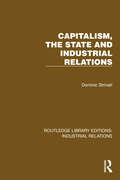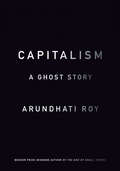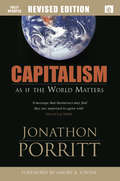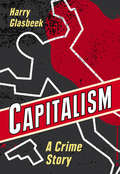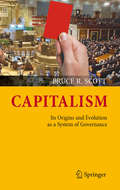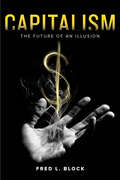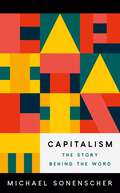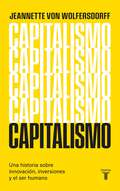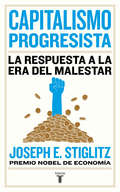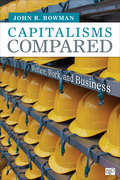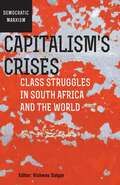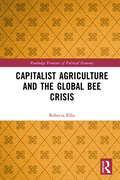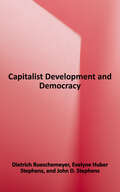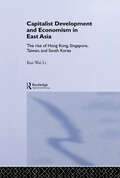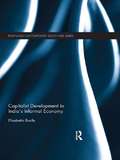- Table View
- List View
Capitalism, Power and Innovation: Intellectual Monopoly Capitalism Uncovered (Routledge Studies in the Economics of Innovation)
by Cecilia RikapIn contemporary global capitalism, the most powerful corporations are innovation or intellectual monopolies. The book’s unique perspective focuses on how private ownership and control of knowledge and data have become a major source of rent and power. The author explains how at the one pole, these corporations concentrate income, property and power in the United States, China, and in a handful of intellectual monopolies, particularly from digital and pharmaceutical industries, while at the other pole developing countries are left further behind. The book includes detailed empirical mappings of how intellectual monopolies develop and transform knowledge from universities and open-source collaborations into intangible assets. The result is a strategy that combines undermining the commons through privatization with harvesting from the same commons. The book ends with provoking reflections to tilt the scale against intellectual monopoly capitalism and arguing that desired changes require democratic mobilization of workers and citizens at large. This book represents one of the first attempts to capture the contours of an emerging new era where old perspectives lead us astray, and the old policy toolbox is hopelessly inadequate. This is true for the idea that the best, or only, way to promote innovation is to transform knowledge into private property. It is also true for anti-trust policies focusing exclusively on consumer prices. The formation of global infrastructures that lead to natural monopolies calls for public rather than private ownership. Scholars and professionals from the social sciences and humanities (in particular economics, sociology, political science, geography, educational science and science and technology studies) will enjoy a clear and all-embracing depiction of innovation dynamics in contemporary capitalism, with a particular focus on asymmetries between actors, regions and topics. In fact, its topical issue broadens the book’s scope to those curious about how innovation networks shape our world.
Capitalism, Primitive and Modern: Some Aspects of Tolai Economic Growth
by T. Scarlett EpsteinThe merit of the Tolai case study lies in the fact that "the schema of economic growth of small underdeveloped societies," which it represented, "when abstracted from its specific background," appeared to be "logically likely to fit other similar societies in Melanesia and elsewhere." Epstein is especially sensitive to the role of cultural traditions, giving her work importance in the field of economic anthropology. She has taken a substantivist as against a purely formalist view of the processes of economic development.
Capitalism, Social Privilege and Managerial Ideologies (Routledge Revivals)
by Ernesto R. GantmanOriginally published in 2005. This book analyzes the evolution of administrative thought from the nineteenth century to the present, considering it as ideological discourse. Rather than merely being a succession of fads, Gantman shows how each successive discourse about the organization of work serves to legitimate social interests. The book's compelling conclusion is that instead of a tendency towards increasing theoretical refinement, what is more evident is a trend towards fictionalization, which ends in the contemporary paradigm of flatter, more participative and democratic organizational forms. Students and scholars interested in organization theory, management history, the sociology of work or critical management will gain many new insights from this historical reconstruction of the evolution of management thought.
Capitalism, Socialism and Democracy
by Joseph A. SchumpeterCapitalism, Socialism and Democracy remains one of the greatest works of social theory written in the twentieth Century. Schumpeter's contention that the seeds of capitalism's decline were internal, and his equal and opposite hostility to centralist socialism have perplexed, engaged and infuriated readers since the book's first publication in 1943. By refusing to become an advocate for either position, Schumpeter was able both to make his own great and original contribution and to clear the way for a more balanced consideration of the most important social movements of his and our time.
Capitalism, Socialism and Democracy (Routledge Classics Ser.)
by Joseph A. SchumpeterCapitalism, Socialism and Democracy remains one of the greatest works of social theory written this century. When it first appeared the New English Weekly predicted that `for the next five to ten years it will cetainly remain a work with which no one who professes any degree of information on sociology or economics can afford to be unacquainted.' Fifty years on, this prediction seems a little understated.Why has the work endured so well? Schumpeter's contention that the seeds of capitalism's decline were internal, and his equal and opposite hostility to centralist socialism have perplexed, engaged and infuriated readers since the book's publication. By refusing to become an advocate for either position Schumpeter was able both to make his own great and original contribution and to clear the way for a more balanced consideration of the most important social movements of his and our time.
Capitalism, Socialism, Ecology
by Chris Turner Andre GorzIn this major new book, Andre Gorz expands on the political implications of his prescient and influential Paths to Paradise and Critique of Economic Reason. Against the background of technological developments which have transformed the nature of work and the structure of the workforce, Gorz explores the new political agendas facing both left and right. Each is in disarray: the right, torn between the demands of capital and the 'traditional values' of its supporters, can only offer illusory solutions, while the left either capitulates to these or remains tempted by regressive, 'fundamentalist' projects inappropriate to complex modern societies. Identifying the grave risks posed by a dual society with a hyperactive minority of full-time workers confronting a silenced majority who are, at best, precariously employed, Gorz proposes a new definition of a key social conflict within Western societies in terms of the distribution of work and the form and content of non-working time.Taking into account changing cultural attitudes to work, he re-examines socialism's historical project--which, he contends, has always properly been to lay down the rules and limits within which economic raitonality may be permitted to function, not to create some statist, productivist countersystem. Above all, he offers a vital fresh perspective for the left, whose objective, in his view, must be to extend the sphere to autonomous human activity, and increase the possibilities for individual self-fulfilment.
Capitalism, the State and Industrial Relations (Routledge Library Editions: Industrial Relations)
by Dominic StrinatiCapitalism, the State and Industrial Relations (1982) examines the many different forms of state intervention in industrial relations in Britain, among them being corporatism, liberalism, paternalism and pluralism. This discussion puts forward a sociological explanation of some of the determinants of state intervention. It concentrates on the period since 1960 and on policies such as those embodied in the Industrial Relations Act of 1971 and the Employment Protection Act of 1975. Institutional changes, such as the formation of the Commission on Industrial Relations and of the Advisory, Conciliation and Arbitration Service, are also considered. With this in view, this book examines the relationship between class structure, class conflict and state power. The role and influence of organised labour and the industrial working class on the formulation of policy are assessed in order to clarify the social forces constraining and shaping the intervention of the state in industrial relations. One crucial conclusion to emerge is a sceptical assessment of the possibilities for the establishment of a successful corporatist control of industrial relations by means of the state in Britain.
Capitalism: A Conversation in Critical Theory
by Nancy Fraser Rahel JaeggiA scintillating conversation on capitalism and crisis from two of our most incisive political philosophersCapitalism, by the twenty-first century, has brought us an era of escalating, overlapping crisis–ecological, political, social–which we may not survive.In this brilliant, wide-ranging conversation, political philosophers Nancy Fraser and Rahel Jaeggi identify capitalism as the source of the devastation and examine its in-built tendency to crisis. In an exchange that ranges across history, critical theory, ecology, feminism and political theory, Fraser and Jaeggi find that capitalism's tendency to separate what is connected–human from non-human nature, commodity production and social reproduction–is at the heart of its crisis tendency.These "boundary struggles," Fraser and Jaeggi conclude, constitute capitalism's most destructive power but are also the sites where a fighting left movement might be able to halt the destruction and build the non-capitalist future we so desperately need.A crucial text for students of political theory, economic theory, and social change, Capitalism offers an invigorated critique of twenty-first century capitalism and an incisive study of our current conjuncture.
Capitalism: A Ghost Story
by Arundhati RoyThe &“courageous and clarion&” Booker Prize–winner &“continues her analysis and documentation of the disastrous consequences of unchecked global capitalism&” (Booklist). From the poisoned rivers, barren wells, and clear-cut forests, to the hundreds of thousands of farmers who have committed suicide to escape punishing debt, to the hundreds of millions of people who live on less than two dollars a day, there are ghosts nearly everywhere you look in India. India is a nation of 1.2 billion, but the country&’s one hundred richest people own assets equivalent to one-fourth of India&’s gross domestic product.Capitalism: A Ghost Story examines the dark side of democracy in contemporary India and shows how the demands of globalized capitalism have subjugated billions of people to the highest and most intense forms of racism and exploitation. &“A highly readable and characteristically trenchant mapping of early-twenty-first-century India&’s impassioned love affair with money, technology, weaponry and the &‘privatization of everything,&’ and—because these must not be impeded no matter what—generous doses of state violence.&” —The Nation &“A vehement broadside against capitalism in general and American cultural imperialism in particular . . . an impassioned manifesto.&” —Kirkus Reviews &“Roy&’s central concern is the effect on her own country, and she shows how Indian politics have taken on the same model, leading to the ghosts of her book&’s title: 250,000 farmers have committed suicide, 800 million impoverished and dispossessed Indians, environmental destruction, colonial-like rule in Kashmir, and brutal treatment of activists and journalists. In this dark tale, Roy gives rays of hope that illuminate cracks in the nightmare she evokes.&” —Publishers Weekly
Capitalism: A Very Short Introduction
by James FulcherThis Introduction explores the origins of capitalism and questions whether it did indeed originate in Europe. It examines a distinctive stage in the development of capitalism that began in the 1980s, in order to understand where we are now and how capitalism has evolved since. The book discusses the crisis tendencies of capitalism--including the S.E. Asian banking crisis, the collapse of the Russian economy, and the 1997-1998 global financial crisis--asking whether capitalism is doomed to fail. In the end, the author ruminates on a possible alternative to capitalism, discussing socialism, communal and cooperative experiments, and alternatives proposed by environmentalists.
Capitalism: As If the World Matters
by Jonathon PorrittAs our great economic machine grinds relentlessly forward into a future of declining fossil fuel supplies, climate change and ecosystem failure, governments are at long last beginning to question the very structure of the global economy. In this fresh, politically charged analysis, Jonathon Porritt wades in on the most pressing question of the 21st century: can capitalism, as the only real economic game in town, be retooled to deliver a sustainable future? Porritt argues that indeed it can, and it must, as he lays out the framework for a new ?sustainable capitalism? that cuts across the political divide and promises a prosperous future of wealth, equity and ecosystem integrity.
Capitalism: How Law Shelters Shareholders And Coddles Capitalism
by Harry GlasbeekA mugger to a stranger, “Give me your wallet or I will beat you to pulp!” It is a crime. An employer says to a worker: “Adding lung-saving ventilation will reduce my profit. Give me back some of your wages and I will let you keep your lungs!” This is not a crime. Our assumptions about the world condition us to see these situations as legally different from one another. But what if we, the critics of corporate capitalism, instead insisted on taking the spirit of law, rather than its letter, seriously? It would then be possible to describe many of the daily practices of capitalists and their corporations as criminal in nature, even if not always criminal by the letter and formality of law. In Capitalism: A Crime Story, Harry Glasbeek makes the case that if the rules and doctrines of liberal law were applied as they should be according to law’s own pronouncements and methodology, corporate capitalism would be much harder to defend.
Capitalism: Its Origins and Evolution as a System of Governance
by Bruce R. ScottTwo systems of governance, capitalism and democracy, prevail in the world today. Operating simultaneously in partially distinct domains, these systems rely on indirect governance through regulated competition to coordinate actors; inevitably, these systems influence and transform each other. This book rejects the simple equation of capitalism with markets in favor of a three-level system, a model which recognizes that markets are administered by regulators through institutions and governed by a political authority with the power to regulate behavior, punish transgressors, and redesign institutions. This system's emergence required the sovereign to relinquish some power in order to release the energies of economic actors. Rather than spreading through an unguided natural process like trade, capitalism emerged where competitive pressures forced political authorities to take risks in order to achieve increased revenues by permitting markets for land, labor, and capital.
Capitalism: The Future of an Illusion
by Fred L. BlockVirtually everyone—left, right, and center—believes that capitalist economies are autonomous, coherent, and regulated by their own internal laws. This view is an illusion. The reality is that economies organized around the pursuit of private profit are contradictory, incoherent, and heavily shaped by politics and governmental action. But the illusion remains hugely consequential because it has been embraced by political and economic elites who are convinced that they are powerless to change this system. The result is cycles of raised hopes followed by disappointment as elected officials discover they have no legitimate policy tools that can deliver what the public wants. In Capitalism, leading economic sociologist Fred L. Block argues that restoring the vitality of the United States and the world economy can be accomplished only with major reforms on the scale of the New Deal and the post–World War II building of new global institutions.
Capitalism: The Story behind the Word
by Michael SonenscherHow the history of a word sheds new light on capitalism and modern politicsWhat exactly is capitalism? How has the meaning of capitalism changed over time? And what&’s at stake in our understanding or misunderstanding of it? In Capitalism, Michael Sonenscher examines the history behind the concept and pieces together the range of subjects bound up with the word. Sonenscher shows that many of our received ideas fail to pick up the work that the idea of capitalism is doing for us, without us even realizing it.&“Capitalism&” was first coined in France in the early nineteenth century. It began as a fusion of two distinct sets of ideas. The first involved thinking about public debt and war finance. The second involved thinking about the division of labour. Sonenscher shows that thinking about the first has changed radically over time. Funding welfare has been added to funding warfare, bringing many new questions in its wake. Thinking about the second set of ideas has offered far less room for manoeuvre. The division of labour is still the division of labour and the debates and discussions that it once generated have now been largely forgotten. By exploring what lay behind the earlier distinction before it collapsed and was eroded by the passage of time, Sonenscher shows why the present range of received ideas limits our political options and the types of reform we might wish for.
Capitalism: The Unknown Ideal
by Ayn RandEssays on the theory and history of capitalism by Ayn Rand, Alan Greenspan, Nathaniel Branden, Robert Hessen, and on its current state by Rand and Branden.
Capitalismo
by Jeannette Von WolfersdorffUn brillante ensayo que analizar y profundiza en las bondades y problemas del modelo económico y social que nos rige. En su debut como ensayista, la destacada economista alemana reflexiona sobre el capitalismo, mirado desde los lentes de la actualidad, de la historia y de la ciencia evolutiva y la neurociencia. Abordando cuestiones como la innovación, inversiones y el ser humano y haciendo lecturas críticas de los grandes economistas modernos, esta reflexión busca contribuir en Chile al debate sobre reformas estructurales que el país (la economía y los mercados principalmente) necesita. Un libro que invita a pensar cómo regular mejor los mercados para que contribuyan al interés de las mayorías en las sociedades, y no solo a unos pocos.
Capitalismo progresista: La respuesta a la era del malestar
by Joseph E. StiglitzUn brillante y provocador manifiesto para salvar al capitalismo de sí mismo. Todos tenemos la sensación de que el sistema económico se inclina a favor de las grandes empresas. Unas pocas corporaciones dominan sectores enteros; la industria financiera regula la economía a su antojo; los gobiernos negocian acuerdos comerciales que en absoluto benefician a los intereses de los ciudadanos; y las tecnológicas custodian celosamente una ingente cantidad de datos personales sin supervisión y trafican con ellos. Las nuevas tecnologías, lejos de ayudar, tienden a empeorar las cosas, contribuyendo a disparar la desigualdad, ralentizar el crecimiento y fomentar el desempleo. Pese a todo, Joseph Stiglitz, premio Nobel de Economía, insiste en que, aunque no nos lo parezca, tenemos el poder de reconstruir los cimientos del capitalismo. En este oportuno libro, identifica las verdaderas fuentes de la prosperidad económica compartida, basadas en la investigación, la educación y el imperio de la ley. Consciente de los peligros del fundamentalismo de mercado, y de la amenaza al poder judicial, las universidades y los medios de comunicación, instituciones que durante mucho tiempo han sido la base de la prosperidad y la democracia, nos descubre cómo hemos llegado a esta situación y marca el camino para combatir algunos de los mayores desafíos de nuestro tiempo. La crítica ha dicho...«Una defensa autorizada de la intervención del gobierno utilizando la economía convencional y una explicación de cómo construir una sociedad más justa sin sacrificar el crecimiento.»Gavin Jacobson, Financial Times «Sus recetas radicales.»Gerard Baker, The Times «Capitalismo progresista aporta ideas y ambiciones a los trabajos previos de Stiglitz.»Daniel W. Drezner, The New York Times «Urgente. Si no abordamos el aumento de la desigualdad causada por la globalización mal administrada y la liberalización financiera, el discurso demagógico encontrará una audiencia receptiva.»The New Yorker «Stiglitz es un economista increíblemente brillante.»Paul Krugman «Junto con Krugman y Piketty, Stiglitz forma el triunvirato de los principales críticos económicos del capitalismo global.»Andrew Anthony, The Guardian
Capitalismo, nada más: El futuro del sistema que domina el mundo
by Branko MilanovicUna descripción provocativa del ascenso del capitalismo al dominio global y, a medida que diferentes modelos de capitalismo compiten por el liderazgo mundial, una mirada a lo que puede depararnos el futuro. Todos somos capitalistas ahora. Por primera vez en la historia humana, el mundo está dominado por un único sistema económico. En Capitalismo, solo -y nada más, el destacado economista Branko Milanovic explica las razones de este cambio histórico decisivo desde los días del feudalismo y, más tarde, del comunismo. Examinando diferentes variantes de capitalismo, se pregunta: ¿Cuáles son las perspectivas para un mundo más justo ahora que este sistema domina? Sus conclusiones son aleccionadoras, pero no fatalistas. El capitalismo tiene muchas fallas, pero también virtudes, y ha llegado para quedarse. Nuestra tarea es mejorarlo. Milanovic sostiene que el capitalismo ha triunfado porque funciona. Ofrece prosperidad y satisface los deseos humanos de autonomía. Pero tiene un precio moral, y nos empuja a perseguir el éxito material como objetivo final. Además, no ofrece ninguna garantía de estabilidad. En Occidente, el capitalismo liberal cruje bajo las tensiones de la desigualdad y el exceso capitalista. En China, el capitalismo político, que muchos afirman que es más eficiente, es también más vulnerable a la corrupción y, cuando el crecimiento es lento, a los disturbios sociales. En cuanto a los problemas económicos del Sur global, Milanovic ofrece un plan creativo, aunque controvertido, para la migración a gran escala. Mirando hacia el futuro, rechaza a los profetas que proclaman un resultado único e inevitable, ya sea la prosperidad mundial o el desempleo masivo impulsado por robots. El capitalismo es un sistema arriesgado. Pero es un sistema humano. Nuestras elecciones, y cuán claramente las veamos, determinarán cómo nos sirve.
Capitalisms Compared: Welfare, Work, and Business
by John R. BowmanHow different would Americans’ lives be if they had guaranteed access to health care, generous public pensions, paid family leave, high-quality public pre-school care, increased rights at work, and a greater say in how corporations are run? This one-of-a-kind book emphasizes that differences in policies and institutions affect the lives of citizens by comparing health, pension, and family policies, as well as labor markets and corporate governance in the United States, Sweden, and Germany. Demonstrating that the US model of capitalism is not the only one that is viable, Bowman encourages students not only to rethink their assumptions about what policy alternatives are feasible, but also to learn more about American capitalism through insightful contrast. Covering a wide range of policy areas and written in a crisp, engaging style, Capitalisms Compared is a perfect companion for courses in political economy and public policy.
Capitalism’s Crises: Class struggles in South Africa and the world (Democratic Marxism Sereis Ser.)
by VishwasSatgarThe contributors to this volume draw on a non-dogmatic Marxist approach to explain the systemic and conjunctural dynamics of crisis inherent in global capitalism. Their analysis asks what is historically specific to capitalism's crises while avoiding catastrophic or defeatist claims. At the same time the volume situates left agency within actual patterns of resistance and class struggle to clarify the potential for transformative change.The cycle of resistance strengthened by the World Socal Forum and transnational activism is now punctuated by the experience of the Arab Spring, the agency of anti-systemic movements, left think tanks, the Occupy Wall Street Movement, labour unions, left parties in Europe such as Syrizia and Podemos and peoples' budgeting in Kerala, India. On the down side, we are witnessing the waning of the Workers Party in Brazil and serious challenges for South Africa's once powerful labour movement and still formative social justice activism. All these developments are assessed in this volume.This is the second volume in the Democratic Marxism series. It elaborates on crucial themes introduced in the first volume, Marxism in the 21st Century: Crisis, Critique and Struggle (edited by Michelle Williams and Vishwas Satgar).
Capitalist Agriculture and the Global Bee Crisis (Routledge Frontiers of Political Economy)
by Rebecca EllisCapitalist agriculture relies heavily on the pollination work of bees, but this system harms bees in innumerable ways. Indeed, human agriculture is one of the main culprits for the declining populations of wild bees and the declining health of honeybees. This book presents a political ecology of pollination that critically examines how managed honey bees and wild bees are harmed by capitalist agriculture. The book focuses on the three most urgent problems: the standardization and simplification of landscapes through monocultures; the use of pesticides including neonicotinoids, other insecticides, herbicides, and fungicides; and the embeddedness of commercial, migratory beekeeping in the capitalist agriculture system which, among other things, has the potential to spread pests and pathogens across continents. At the heart of this crisis is the power and influence that a small group of agrochemical corporations have over national and international agricultural policy. The book argues for an interspecies alliance of small-scale farmers, bee advocates, beekeepers, environmentalists, and bees themselves, along with a vision for an agricultural system that nurtures multispecies flourishing. This book will be of significant interest to readers of political ecology, animal geography, environmental anthropology, food system studies, and critical animal studies.
Capitalist Development and Democracy
by Dietrich Rueschemeyer John D. Stephens Evelyne Huber StephensIt is a commonplace claim of Western political discourse that capitalist development and democracy go hand in hand. Cross-national statistical research on political democracy supports this claim. By contrast, comparative historical studies carried out within a political economy approach argue that economic development was and is compatible with multiple political forms. The authors offer a fresh and persuasive resolution to the controversy arising out of these contrasting traditions. Focusing on advanced industrial countries, Latin America, and the Caribbean, they find that the rise and persistence of democracy cannot be explained either by an overall structural correspondence between capitalism and democracy or by the role of the bourgeoisie as the agent of democratic reform. Rather, capitalist development is associated with democracy because it transforms the class structure, enlarging the working and middle classes, facilitating their self-organization, and thus making it more difficult for elites to exclude them. Simultaneously, development weakens the landed upper class, democracy's most consistent opponent. The relationship of capitalist development to democracy, however, is not mechanical. As the authors show, it depends on a complex interplay of three clusters of power: the balance of power among social classes, power relations between the state and society, and transnational structures of economic and political power. Looking to the future, the book concludes with some reflections on current prospects for the development of stable democracy in Latin America and Eastern Europe.
Capitalist Development and Economism in East Asia: The Rise of Hong Kong, Singapore, Taiwan and South Korea (Routledge Studies in the Growth Economies of Asia #Vol. 35)
by Kui-Wai LiTaking a conceptual approach, this book studies the economic development of the four East Asian economies since 1950. The author summarizes and reconsiders many of the arguments and findings that supported and explained the economic 'miracles' of Hong Kong, Singapore, Taiwan and South Korea, analysing the relationship between economic development, growth and political economy.This pioneering book will stimulate further analysis of East Asian development. It will be of essential interest to scholars in East Asian economics, and all those interested in modern economic development.
Capitalist Development in India's Informal Economy (Routledge Contemporary South Asia Series)
by Elisabetta BasileThis book explores the economy and society of Provincial India in the post-Green Revolution period. It argues that the low 'quality' of capital development in India's villages and small towns is the joint outcome of the informal economic organisation, that is strongly biased in favour of capital, and of the complex stratification of the workforce along class and caste lines. Focusing on the processes of growth induced by the introduction of the high-yield varieties in agriculture, the book demonstrates that a low-road pattern of capitalist development has been emerging in provincial India: firms compete over price and not over efficiency, with a constant pressure to reduce costs, in particular labour costs. The book shows that low-skilled employment prevails and low wages and poor working conditions are widespread. Based on original empirical research, the book makes a valuable contribution to the debate on varieties of capitalism, in particular of the Global South. It is of interest to academics working in the fields of Development Studies, Political Economy and South Asian Studies.






